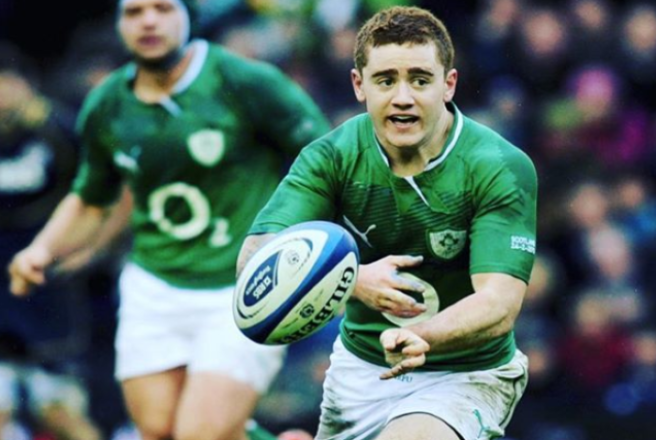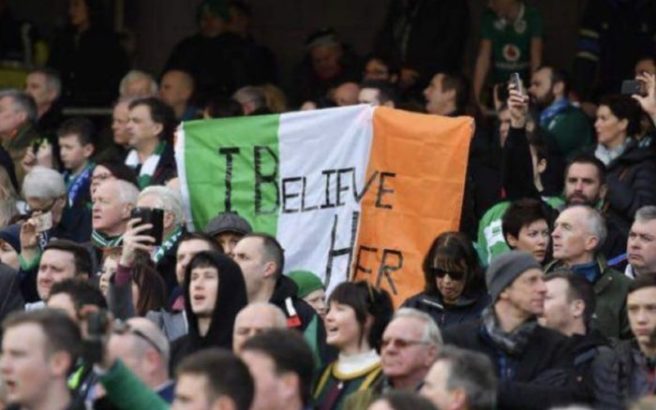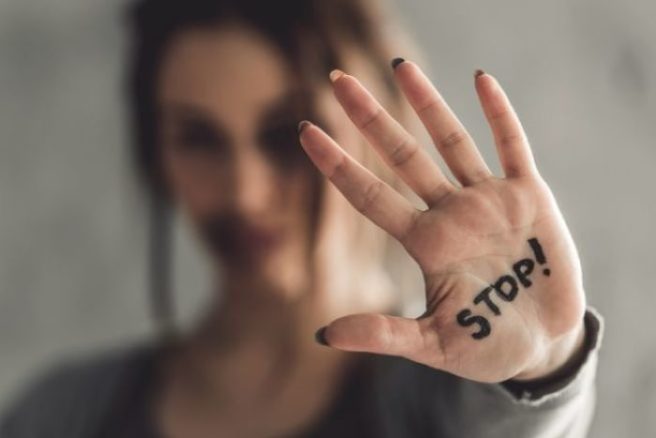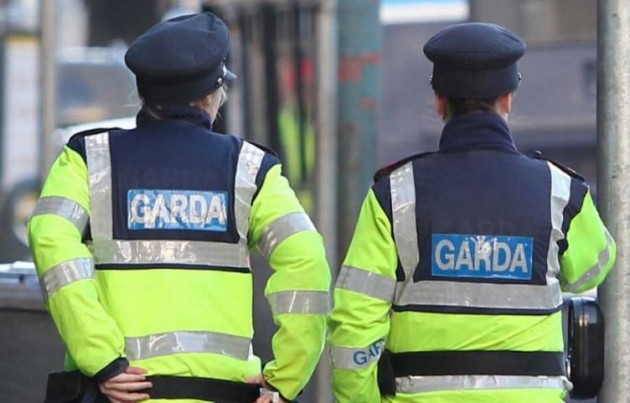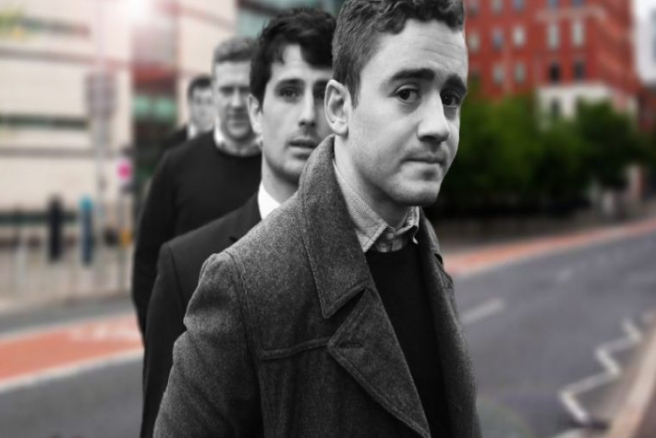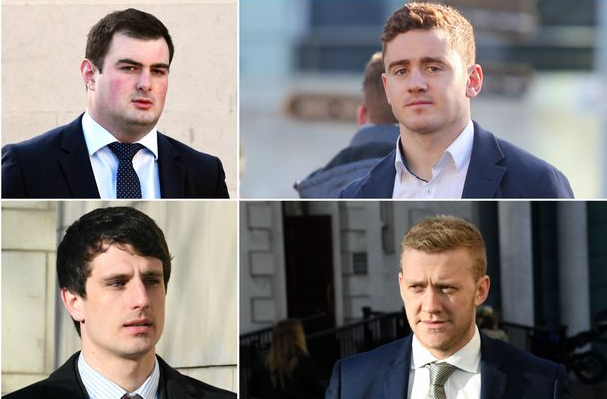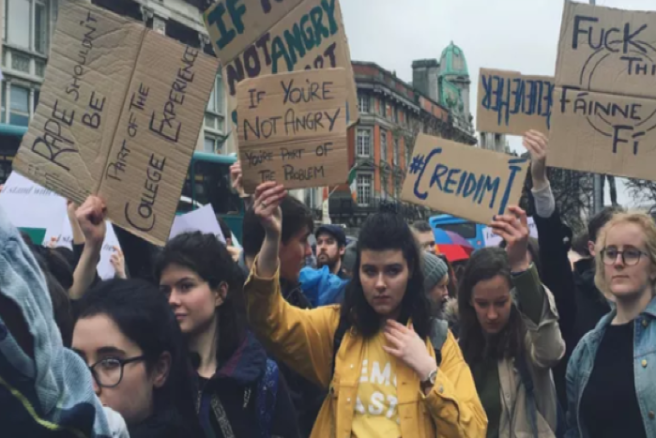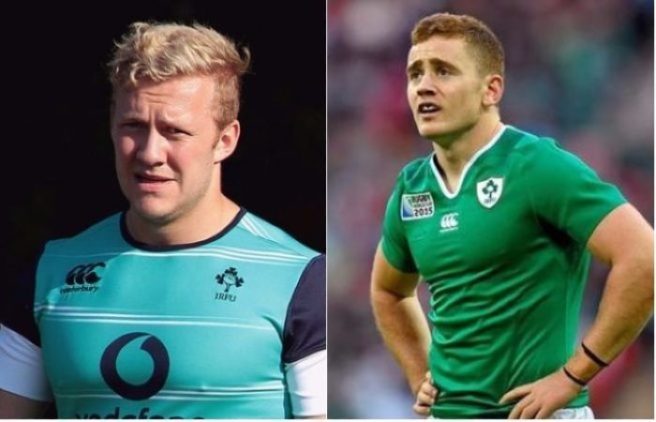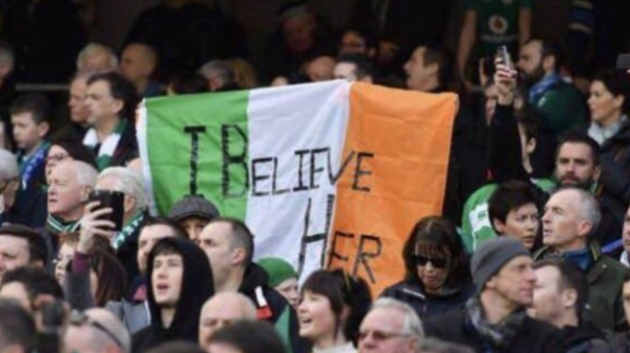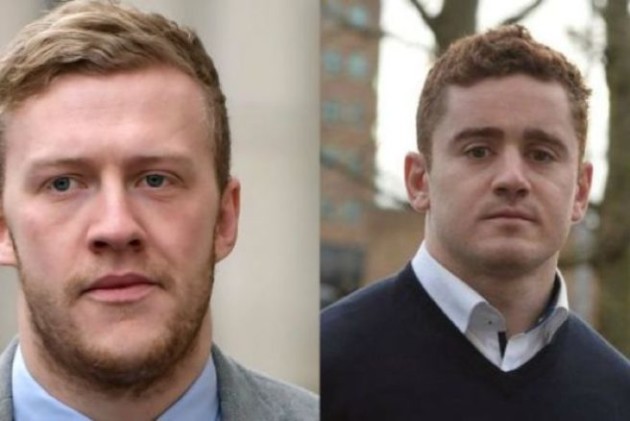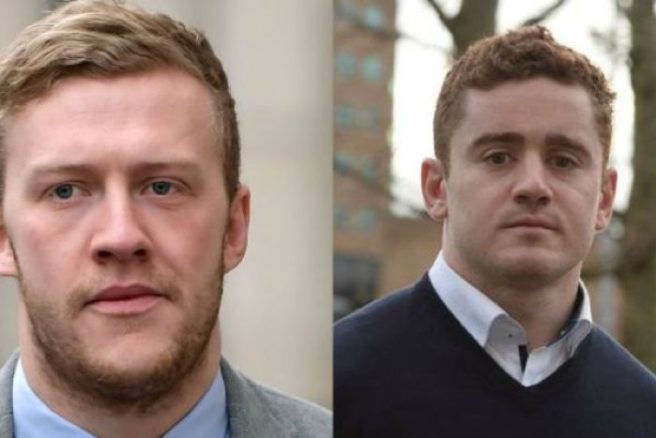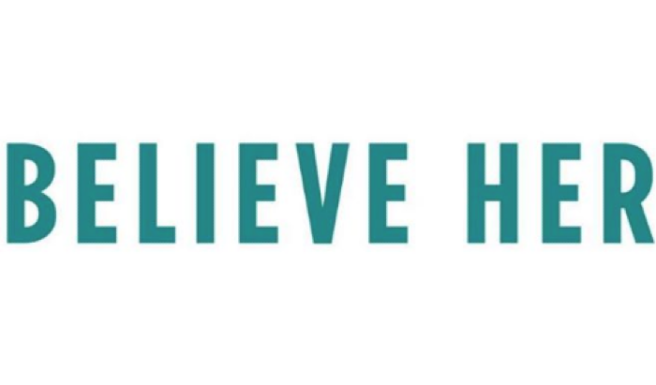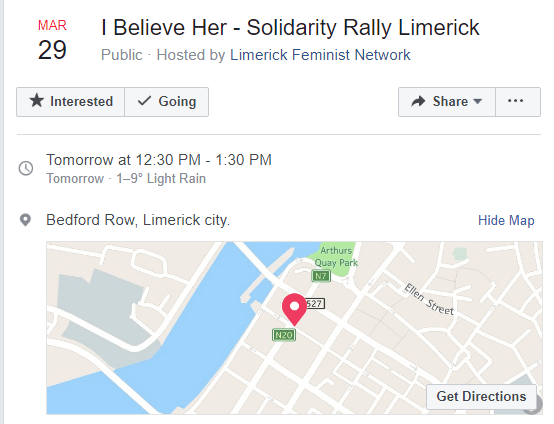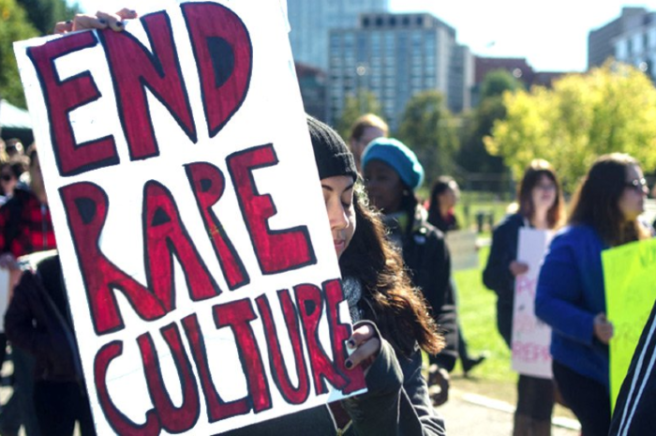
‘Irish Sluts’: Ireland’s rape culture and the power of words
The constant sharing of intimate images of women without consent shines a light on how women are seen in our society: things to be looked at, owned and consumed. Objects.
In the #MeToo era, naive groups of people often declare that the treatment of women as purely sexual objects for men to consume is long gone. Other groups say this treatment has never even existed, despite overwhelming evidence to the contrary.
Some even say women deserve their personal images shared without consent; if they took the picture in the first place, they were asking for it.
Following numerous incredibly painful rape cases in this country, healthcare scandals which throw female lives away and the Repeal movement, women have had to face emotional trauma in the Emerald Isle. Rape culture is alive and well in our society, yet most have been desensitised to it.
Today we attended the #IBelieveHer rally in Dublin – where hundreds of students joined in a call to end misogyny and rape culture in Ireland pic.twitter.com/E3MEDU1N9B
— Union Of Students In Ireland (@TheUSI) March 31, 2018
Every few days, a reminder rears its ugly head to show us what we can’t forget, to nudge us into submission and point out the fact that women today still have to protect ourselves at all times and we can’t forget it.
Today’s reminder comes from a Reddit page by the charming name of ‘Irish Sluts’. TheJournal.ie reported that a page was sharing intimate images of young women without their consent online, with sexually explicit commentary by the website’s users. No doubt derogatory language was chosen about the women’s body and appearance.
“The content includes portraits of families, social media posts, and images of women walking in public or in the gym, but there are also nude photographs taken in more intimate settings. Details of where the women live and where they attend college or school are also posted on the site,” it was reported, with the Garda Síochana confirming. Members of the group also made sure to request ‘nudes’ from counties all over the country, mentioning specific women by name.
Victim of 'Irish Sluts' Reddit page says she felt 'physically sick' when she saw her photos online (via @thejournal_ie) https://t.co/GJX3XwfWoj
— Women's Aid Ireland (@Womens_Aid) February 10, 2019
One woman said that she was alerted about her image being used in the group when a male friend saw it in a WhatsApp chat and alerted her, she told TheJournal.ie. “I got a call from a friend of mine who said that my photo was being sent around lots of WhatsApp groups,” she said.
Speaking anonymously, the woman said she felt violated and “nearly got sick” when she discovered the Reddit page. The Gardaí can’t carry out much action unless you’re underage, and the advice is to actually contact the group itself to solve the matter. So essentially there is zero authority who can regain control over the private images of you and return them to the owner, making the internet an even more dangerous place.
This isn’t the first incident, of course, and it won’t be the last. ‘Revenge porn’ is alive and well; the habit of using sexually explicit images of an ex partner in order to use against them with malicious intent, such as posting them online or sending them to an employer.
A friend of another victim of this site told TheJournal.ie: “I’m not under any illusions that these types of things go on in parts of the internet, but this is very Ireland orientated and I can’t get my head around the fact that it happens so blatantly on a mainstream site like reddit that has businesses advertising on it, etc. People are posting personal details on some pictures, names, addresses, etc. It’s not sitting right with me that these girls can be put in this type of physical/mental danger without them knowing especially given some of the other things in the news cycle in the last few days.”
Reddit shuts down 'Irish Sluts' forum for posting revenge porn: https://t.co/ZwYJ1Wh57J pic.twitter.com/yahradvygL
— The Daily Dot (@dailydot) February 8, 2019
Brendan Howlin, Labour leader, has said that Ireland is extremely far behind when it comes to dealing with the issue of revenge porn. The Harassment, Harmful Communications and Related Offences Bill aims for a six-month prison sentence upon conviction, but is still before the Oireachtas. While time is ticking, the internet is abusing images of women all over Ireland.
Literally the only law protecting against the distribution of images such as these without permission is contained in the Non Fatal Offences Against The Person Act. There is a subsection of this act which deals with harassment but no specific laws in place to guard against revenge porn or unconsensual sharing of personal or explicit images.
What does this say about how the men of Ireland see us?
Most of us will be able to distinctly recall the infamous Belfast rape trial involving four Ulster Rugby players; Stuart Olding, Paddy Jackson, Rory Harrison and Blane McIlroy. Whether you were team I Believe Her or not, the language used in the WhatsApp group featuring the four men about the alleged victim and Irish women in general was beyond disturbing.
Toxic masculinity, entitlement and objectification reeks from texts such as these, but why does society continue to believe that wealthy, white, heterosexual young men with privilege are incapable of rape and sexual assault? They discuss women as sex objects for their fetishization, and why wouldn’t they go any further than that? Humiliation is the first step to dehumanise a person. Once someone is dehumanised enough, it becomes easier and easier to mistreat them.
The #UCD200 became a huge scandal that spawned an investigation after claims of a Facebook group involving 200 UCD students who were sharing nonconsensual sexually explicit images of women without their knowledge were made public. The investigation found no evidence, but one of the most noteworthy aspects of the incident was how easily believable it was. This happens to women every single day, I have lost count of friends who have had private and intimate images of themselves shared without their consent; myself included.
The language used by Irish men is mirrored in the sexual assault trials and courtrooms; the recent Cork case involving a young woman who accused a man of raping her in an alley had her underwear used as evidence against her. A female barrister held up a lacy thong, and claimed that only a woman who WANTED to have sex would wear something like that.
Women are often the ones tearing down fellow women with language; toxic femininity is alive and well. We have been taught to compete with each other to win the attention, the approval of men.
The language used to describe women, to portray them as either seductive prostitutes or prudes, ‘sluts’ or nuns, feeds the narrative that what you wear, how much you drink, and your sexual past plays a part in your victimhood. You can’t be a victim if you were asking for it, according to the courts of this nation.
Acquittal doesn’t mean innocence, as anyone who has experienced the Irish sexual violence criminal justice system understands more than they should have to. Why wouldn’t Irish men speak of women in such terms, when they won’t ever have to experience any consequences? Why wouldn’t they join in the lad banter, the ‘locker room talk’ if it leads to a boost in their pride, their status, their brotherhood?
Words have power, they have meaning. Language leads to action, action leads to harm, and most of the time the harm is suffered by Irish women. Why? The patriarchy, toxic masculinity, rape culture; all of it allows Irish men to feel a level of invincibility which encourages them. In Dublin, many of the ‘elite’ schools are segregated by gender; men and women at a young age with privilege only interact on nights out, at school discos most of the time. With alcohol and not many clothes covering them, women are deemed as useless without their looks, but a woman who is sexually provocative is a ‘slut’, a ‘whore’, ‘asking for it’. We are presumed guilty until proven innocent, handed double standards we can never beat, and fear for our safety the second it turns dark, much to the obliviousness of men.
Of course, rape and sexual assault occur where men are the victims, and find it incredibly difficult to speak about or get help due to the culture of masculinity where being a victim is shamed. Only by spreading awareness, and actual facts as well as sexual consent training and sexual education can we reduce the horrifying statistics.
#AskConsent What causes rape = Rapists. There are no grey areas. Sex without consent is rape. It's time to stop the #VictimBlaming & put the focus back where it belongs on the perpetrators. DRCC – 1800 77 8888. pic.twitter.com/MAneahQcdP
— Dublin Rape Crisis (@DublinRCC) February 11, 2019
I was given a single self-defence class at school. Just one. The main thing it taught me was that in the instance of rape, you are to yell the word, ‘fire’, because only then will someone come to offer aid.
A viral post on Facebook by a user named Drew McKenna shared a passage from Jackson Katz’ book named The Macho Paradox: Why Some Men Hurt Women and How All Men Can Help. A prominent social researcher, he decided to test his audience on the ways which they protect themselves on a daily basis from sexual assault. The results were alarming, but not surprising.
The reaction from the male side is especially interesting;
“He first describes the reaction on the male side. “At first there is a kind of awkward silence as the men try to figure out if they’ve been asked a trick question. The silence gives way to a smattering of nervous laughter. Occasionally, a young a guy will raise his hand and say, ‘I stay out of prison.’ This is typically followed by another moment of laughter, before someone finally raises his hand and soberly states, “Nothing. I don’t think about it.'”
Of course, the women could talk all day about how they defend themselves from the threat of rape or sexual assault. “As the men sit in stunned silence, the women recount safety precautions they take as part of their daily routine.” The replies were then arranged into a list, contrasting with the male answers. From holding your car keys between your fingers, never leaving drinks unattended, using a male voice on an answering machine, not wearing headphones in public, not using car parks or parking in dimly lit areas, not meeting a man in private on dates- it paints a horrible picture of the normality of female self-protection, and the total lack of awareness from the male point of view. More men than I can say have refused to walk me home, brought me a drink without watching what men around him were doing to it, spoken in a disgusting manner about women; all without realising that they were causing harm.
All men believe they are good.
RAPE MYTH ‘it’s common for women to falsely allege rape after sex because they regret it or have a boyfriend’. FALSE: false allegations of rape occur infrequently. Research indicates as little as 0.2% to a max of 11% of all allegations #sexualabuseandsexualviolenceawarenessweek pic.twitter.com/avAuHat9v6
— Dr Dominic Willmott (@DrDomWillmott) February 6, 2019
“I moved on her like a b****, but I couldn’t get there. And she was married. “I did try and f*** her.”
“You know, I’m automatically attracted to beautiful—I just start kissing them. It’s like a magnet. Just kiss. I don’t even wait. And when you’re a star, they let you do it. You can do anything. Grab them by the p****. You can do anything.”
Many Irish men like to believe that Donald Trump is an anomaly, something to be laughed at, not feared. Irish women know better. The vast majority of us can report that we’ve been sexually harassed, one-in-four of us will report being sexually assaulted compared to one-in-71 men. A report by Union of Students Ireland (USI) in 2013 found that 1 in 7 people will experience some form of unwanted sexual contact during their time in college. The reports of femicide this year are equally terrifying, with the majority of cases occurring where the perpetrator was a husband, boyfriend or partner of the woman killed.
The line between harassment and assault is easily crossed. Words are just the beginning.
Feature image; Everyday Feminism






